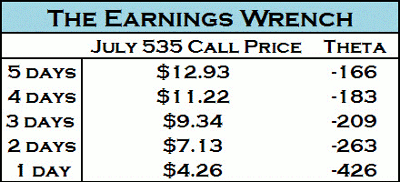Option traders rely heavily on “Greeks” like Delta and Theta, but history shows that when earnings season comes along, the dependability of Theta tends to fade, often leading unknowing traders astray.
Options unlock the ability to profit from the setting of the sun and the ticking of the clock. To those obsessed with the passage of time, the option “Greek” Theta becomes your best friend.
Like a reliable clock, Theta can be counted on day in and day out to provide an accurate estimate of their daily pay for time decay. Some interesting dynamics arise four times a year, however, which diminish the reliability of Theta. It turns out that earnings season is the wrench in the Theta clock.
See related: Option Traders: Don’t Trust Theta
Suppose I’m considering a positive-Theta trade (e.g. iron condors or calendar spreads) by selling July expiration options. Can I expect time decay to erode away at the value of these front-month options if there is an earnings announcement right before July expiration?
The answer is usually no.
Google, Inc. (GOOG) serves as a good case study, as it reports earnings this Thursday (July 14) after hours, one day before expiration.
Would it be wise to place a July iron condor today in an effort to gain exposure to four or five days of time decay, or should we wait until Thursday to place the trade?
The truth is, when an earnings announcement occurs close to expiration, the effect of time decay is negligible. Thus, although Theta increases exponentially as expiration approaches, the price of an out-of-the-money call or put may remain higher than Theta would lead you to believe.
In addressing this subject in The Volatility Edge in Options Trading, Jeff Augen asserts, “The effect we are discussing involves a decoupling of option prices from the current behavior of the underlying security. This decoupling seems rational when you realize that options, like all securities, are priced by the aggressiveness of buyers and sellers. Many investors falsely believe that option prices are set according to the familiar mathematics of volatility and time. In fact, the opposite is true; prices are set by traders who buy and sell contracts using the mathematics as a guideline… It is completely reasonable for the two to decouple, and that is often what happens when earnings are approaching.”
NEXT: Out-of-the-Money GOOG Call Illustrates This Point
|pagebreak|Let’s look at an out-of-the-money call option on GOOG to illustrate. With GOOG trading around $528 at the time of writing, the July 535 call is at $11 and has a Theta of -173, meaning that theoretically, this option should lose $173 a day due to time decay.
Utilizing an options calculator, we can forecast how much the July 535 calls should decline in value day by day until expiration. We’re going to assume the stock price ($528) and implied volatility (65%) remain constant throughout the exercise.
As the table illustrates, we can reasonably expect this option contract to decay rapidly into expiration. However, due to earnings looming on Thursday evening, the July 535 call will most assuredly not decline in value as quickly as Theta is forecasting.
As Jeff Augen points out, there is a “decoupling of option prices…when earnings are approaching”. I’ve mentioned previously that option traders aggressively bid up option premiums in anticipation of a company’s earnings release. This aggressive demand drives up implied volatility and will keep the July 535 call option value higher than what the above table implies.
Although the 535 calls are currently trading with an implied volatility of 65%, it will be much higher on Thursday in anticipation of the large gap that often occurs in GOOG post earnings.
In addition to the negligible effect of time decay, this continual rise in implied volatility in anticipation of an earnings release serves as another reason why it is prudent to hold off on entering short volatility strategies until the day before the earnings announcement. After all, there’s no sense in entering a short strangle on GOOG (or any stock for that matter) right now if it can be entered in a few days at much higher volatility levels.
When analyzing Theta around earnings season, remember its limits and don’t allow it to lead you astray.
By Tyler Craig, trader and blogger, TylersTrading.com











